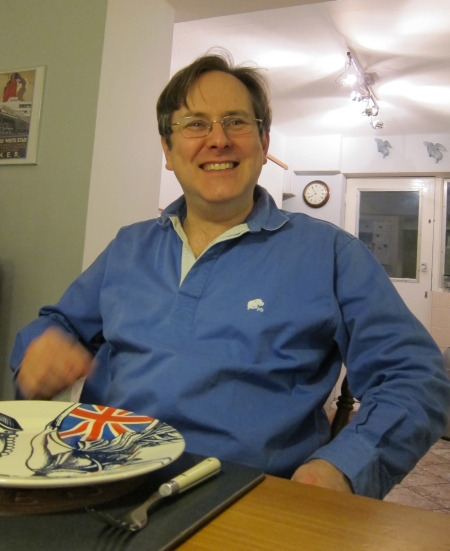We are developing the social individualist meta-context for the future. From the very serious to the extremely frivolous... lets see what is on the mind of the Samizdata people.
Samizdata, derived from Samizdat /n. - a system of clandestine publication of banned literature in the USSR [Russ.,= self-publishing house]
|
A low key get together at Samizdata HQ this year…

The finest pig, heavily smoked, glazed with honey and infused with cloves…

…your hostess, with assorted Central European Fire Water…

… and your host, about to gorge on splendiferous smoked pig and other delightful haram joys

Wishing all friends of liberty a prosperous New Year. Buy gold and drink the very finest grog.
Ten years ago today a Guardian headline read Euro lobby demands stronger lead.
Lord Heseltine effectively accused Mr Blair of a lack of nerve as he dismissed the government’s five economic tests as a “protective barrier” behind which it could “cower in order to have apparently intellectually defensible reasons for putting things off”.
On the next day, 1 January 2002, the same newspaper reported on the launch of the Euro.
The mood was uniformly upbeat at parties, pageants and ceremonies bidding farewell to once-treasured marks, francs, pesetas and lire.
“Our countdown is leading towards a new era,” Wim Duisenberg, the Dutch president of the European Central Bank (ECB), declared in Frankfurt. “By using euros, we will give a clear signal of the confidence and hope we have in tomorrow’s Europe.”
On a day of highs, Gerhard Schröder, the German chancellor, hit the highest note. “We are witnessing the dawn of an age that the people of Europe have dreamed of for centuries: borderless travel and payment in a common currency,” he said in a new year message.
Mr Prodi marked the change by buying flowers in euros, not schillings, on a visit to Vienna. And in remarks that will alarm a British government watching uncomfortably from the sidelines, the former Italian prime minister pledged that the arrival of the euro in people’s pockets would lead “ineluctably” to more economic coordination – the great fear of sceptics.
Lest anyone be tempted to gloat, here is a final quote, this one dating only from a month or two ago, from Patrick Crozier of this parish:
How to stop worrying about “contagion”
Just remember that every country in the Western world already has the disease.
I like this picture:
I found it here. It is an escalator in the process of being replaced, at Charing Cross underground station, London. They’ve taken out the old one. They are now remaking whatever it is the new escalator will sit on top off. Then they will put in the new esacalator. It’s a routine they must have done dozens of times, with local variations to keep them on their toes. I do not doubt that when they finish their work, the escalator in question will function smoothly, no matter how many people ride on it or how heavy their luggage.
What I like about the photo is that it is, for me anyway, a reminder that there are still some things about our world that are progressing very nicely. The engineering of things like escalators continues to improve. But because the complexity that you see in this picture is, when the final object is rolled out, hidden, most people only think of such things on those rare occasions when they don’t work. At which point they grumble.
One of the big divisions in the world now, it seems to me, is between those who assume that such progress will necessarily continue, no matter how many mistakes the politicians make, and those who do not. Some people take technological progress for granted, while others notice it (often because they do it themselves for a living), want it very much to continue, but do not assume that it automatically will continue, no matter what.
Here is an interesting article about growing fear-mongering about nanotechnology. Of course, even one of the founding fathers of the nanotech idea, Eric Drexler, has warned about the underside of this technology.
This might be the only measurement you need to judge the Afghanistan War. Vendors in Kabul are doing a brisk trade in Taliban ringtones. Because Afghans report that the Taliban kill travelers at clandestine checkpoints if they don’t hear one of their messages on someone’s phone.
– The opening sentences of a Wired piece by Spencer Ackerman entitled Either Your Phone Plays Taliban Ringtones, or You Die
I was struck by the tone of an article I recently read by a conservative journalist who simply could not understand why libertarians have not abandoned Ron Paul now that the supposedly deadly leftist power word has been uttered against him along with great waggling of magic wands.
My answer to him and others is that we are a tough lot and I laugh in the face of the PC power words. Unlike Conservative journalists I do not wet my knickers at the thought of someone attempting to tar me with it. Since I know I am not a racist, I simply do not care what anyone says or writes. I am immune, and that is perhaps one of the things which makes people like me and other libertarians even more frightening to the powers that be. We lack proper fear.
Anyone who like myself has been on the front lines of libertarianism for years, for decades even, understands. We have been fighting our battle against hopeless odds with pretty much everyone against us except when it was to their advantage and they felt they had nothing to lose. We are used to losing and then dusting ourselves off and going off to the next battle, and the next battle. Like a horde of Don Quixote’s we have continued to attack the blades of the windmill, but unlike him we are having an effect. Every strike of the lance vibrates the blade, every vibration wears on the bearings, and the wear is starting to make the axle wobble. One day the entire Statist enterprise will tear itself apart and send blades cartwheeling over the countryside and it will be in no small thanks to us.
This is not to say we do not hunger for personal tastes of victory, even if in small ways. The Ron Paul candidacy is one of those. No matter what happens now, we have won hugely. Millions of people have been introduced to ideas that will resonate long after they forget where they heard them. The libertarian genie is well and truly out of the bottle. We win with every day that goes by with us in the race. We win with every million dollars the Ron Paul campaign pours into broadcasting our message, a message of freedom and individualism the media has long ignored, filtered, twisted or blocked. Should he take Iowa and New Hampshire the old boys network of the Republican Party will be out in even more force with their friends in the Democratic Party to stop him. The two may be very different in what they want to do, but they both share a common love of power and your money.
Some made the mistake of thinking the Conservatives were our friends. I knew that was not true. They were only interested in us so long as they thought they could use us to their advantage. Has anyone noticed how the Conservative media turned against us as soon as it looked like we might actually have a real effect on the election? Even Pajamas Media has taken a decidly anti-libertarian turn. I must admit that one surprised me a bit, but as to the rest, I fully expected it.
I still do not expect Ron Paul will win, but God Almighty, I do intend to let those Sons of Bitches know we libertarians were there. If you are Conservative and you still do not understand why we fight after reading this missive… you are really rather dense.
It is simple. After thirty-five years, we have finally tasted blood in the political scene and for once it is not our own.
I like this:
CAPE TOWN. After 28 years of silently tolerating it, a group of unemployed local musicians have joined forces to release a Christmas single, entitled ‘Yes we do,’ in response to the Bob Geldof inspired Band Aid song, ‘Do they know it’s Christmas?’
Thankyou to Tim Worstall for spotting this.
Speaking at the launch of the single, whose proceeds will go towards teaching discipline, literacy and contraception at British schools, composer and singer Boomtown Gundane said that for years he had been irked by Geldof’s assumption that hungry Africans were also stupid.
Sadly, it’s a joke. But quite a good one, I think.
“One of the more unexpected things I discovered as CEO of a pharmaceutical company was that I had to think as much or more about the federal government than I did about our competition. I had known on an intellectual level that government was involved in the private sector in a great many ways, but it was only when I was actually in business that I felt the full impact.”
Donald Rumsfeld, Known and Unknown, page 253. He is describing his time in the private sector during the late 70s and 80s, and emerges as quite a firebrand for supply-side economics (he got to know Arthur Laffer).
Whatever you think of Rummy as a defense secretary (under the Ford and George W. Bush administrations), he comes across as a formidable man of US public and commercial life.
Here is something that I wrote about the FDA and associated drug regulation issues a while ago here.

Arinsal, Andorra. January 2011.

Bourg Madame, France. January 2011.

Roses, Spain. January 2011.

Lisbon, Portugal. February 2011.

Istanbul, Turkey. March 2011.

Slunj, Croatia. April 2011.

Bihać, Bosnia and Herzegovina. April 2011.

Fez. Morocco. May 2011.

Ceuta. May 2011.

Algeciras, Spain. May 2011.

Banwar Seri Begawan, Brunei Darussalam, May 2011.

Coolangatta, Australia. May 2011.

Labuan, Malaysia. May 2011.

Sepilok, Sabah. June 2011.

Lawas, Sarawak. June 2011.

Meden Rudnik, Bulgaria. August 2011.

Bucharest, Romania. August 2011.

Comrat, Gagauzia. August 2011.

Balti, Moldova. August 2011.

Chernivtsi, Ukraine. August 2011.

Kraków, Poland. September 2011.

Bratislava, Slovakia. September 2011.

Brno, Czech Republic. September 2011.

Prilep, Macedonia. September 2011.

Elbasan County, Albania. September 2011.

Prizren, Kosovo. September 2011.

North Stradbroke Island, Australia. October 2011.

Tianjin, China. November 2011.

Vale de Telha, Portugal. December 2011.
On Boxing Day the whole family sat round to watch The Borrowers. This is the latest TV retelling of the charming tale of the two inch tall people who live under floorboards, scavenging from us big people for food and other useful items.
Much of the plot of this version revolves around a professor played by Stephen Fry who captures some of the little people, wants to show them off to the world as an amazing new discovery of natural history and (and this is where it gets far fetched) threatens to dissect them. So the little people spend their entire time avoiding the big people and escaping from them. Which is my problem with The Borrowers.
It is typical of the misanthropy of the mainstream creative arts. Evil humans only want to dissect and eradicate little people. What should happen is that Stephen Fry reveals the little people to the world, and so begins a new age of emancipation for them. There is no question of dissecting them: the human rights activists would not stand for it. And think of the advantages of trade. No more hiding under floorboards and scavenging; the little people get all the benefits of big people technology and big people get all the benefits of little people labour. Not only could they do useful work in confined spaces, but they seem to have human equivalent intelligence so we could run our call centres and get our computer programming done in exchange for fewer resources.
It’s a win win, which supposedly doesn’t make for good drama.
A musical mood struck me on the way to the coffee shop this afternoon and upon my return I recorded this song for friends and any one who finds it interesting. I am more than a couple years away from gigging and touring and sitting about studios and given how busy I am with other things I decided to skip the guitar backup since it would take a day to get it up to performance quality. This is not to say that recording a song in three takes from the printout of the lyrics to ‘final’ on a telephone headset is anything like what I’d do in a professional studio setting. But it will serve and I do not think Judy Garland will come back and haunt me for it.
Have Yourself A Merry Little Christmas. Dale Amon vocals
Merry Christmas to all!
This morning I was prodded by the scourge of epidemiocracy, Chris Snowden, to read this piece by Theodore Dalrymple. What most struck me was not the main argument (I find predictable agreement almost as wearing as disagreement) but this piece of supplementary information:
A higher proportion of the Dutch population smokes than average for a developed country (27 percent), and fewer Dutch people are aware of secondhand, or second-lung, smoke — that breathed in from other people’s tobacco — than any other comparable country.
Why should that be? I think it demands an explanation. Certainly the Dutch population cannot easily be classed as ill-educated or poorly-informed. (I have been sworn at by a drunk tramp on an Amsterdam tram who switched instantly to English invective when he realised that it was going to be more effective in my case.) My mind leapfrogged towards ideas about the Dutch liberal tradition. They choose not to know, because they do not like to hassle people about their private behaviour, perhaps…
Unfortunately there are no sources quoted. When I looked for stats and background info, I found something even odder. That remarkable factoid contains no truth. → Continue reading: Facts and attitudes
|
Who Are We? The Samizdata people are a bunch of sinister and heavily armed globalist illuminati who seek to infect the entire world with the values of personal liberty and several property. Amongst our many crimes is a sense of humour and the intermittent use of British spelling.
We are also a varied group made up of social individualists, classical liberals, whigs, libertarians, extropians, futurists, ‘Porcupines’, Karl Popper fetishists, recovering neo-conservatives, crazed Ayn Rand worshipers, over-caffeinated Virginia Postrel devotees, witty Frédéric Bastiat wannabes, cypherpunks, minarchists, kritarchists and wild-eyed anarcho-capitalists from Britain, North America, Australia and Europe.
|





































